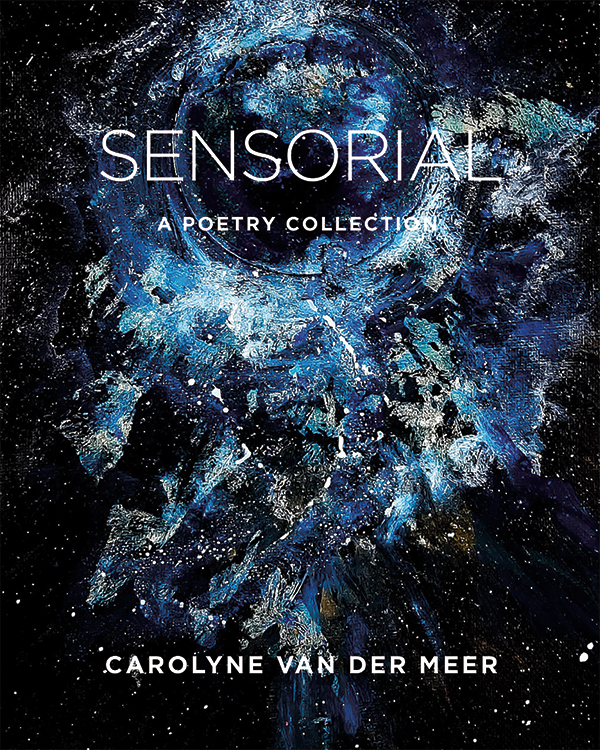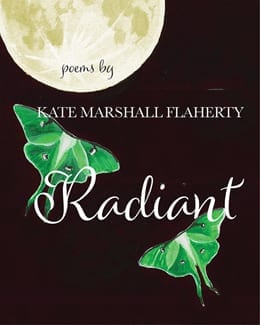Sensorial is a journey in sensory perception. The senses guide us through urban landscapes, animal connections and familial bonds as we consider who we are, where we are—both physically and metaphysically—and what truly matters. Sensorial proposes one set of responses to the never-ending data we process as we navigate through life. In particular, it considers aging and illness on the journey towards life’s end—and examines gain and loss in the aggregate.
“Some things you just can’t know”—so begins Sensorial, a three-part meditation on our role as both spectator and participant in a world of inequity and injustice. Each poem is a finely wrought tableau where “sensations galvanize” and absolutes have no part. At the heart of the collection is a daughter’s complicated relationship with her father and the myriad prisms of that relationship. Tackling a wide range of personal and social themes from loneliness to homelessness to disease and death and the “fault lines[s]” of marriage, Van Der Meer combines a keen narrative sense and an eye for imagery to produce a fine collection infused with compassion and hope.”
—Carolyn Marie Souaid, author of The Eleventh Hour and Yasmeen Haddad Loves Joanasi Maqaittik
“Among the best poets writing in Canada today, Carolyne Van Der Meer shares the genius of Margaret Avison in bringing together the spiritual and the mundane, sometimes in startling juxtaposition. Her technical dexterity is unequalled, as she ranges from writing so terse the words sting, to writing so flowing they sing. Lines often break in the middle without notice, in a kind of subversive caesura. Form follows function; less is invariably more. In “Pantoum for the Homeless,” she turns a rigid archaic verse form into a fluid and intimate account of a life gone pathetically wrong. Sharing details of a menu in Montreal, thoughts while eating pizza on the Champs Élysées, she hovers between the particular and the universal, sharing uneasy familiarity with both. Thoroughly cosmopolitan, she evokes in a few words a story behind tea at Harrods more haunting than the touching story we’re told. Sometimes unnervingly personal she shares with searing directness an unspoken dialogue at her father’s deathbed that rivals Dorothy Livesay’s last words to her own father, Irving Layton’s to his mother. Sensorial arouses the senses, but also, evoking the title’s homophone, it is censorial, confident in exposing the ambiguities of moral judgment. Each poem stands on its own, yet each speaks to the others. Seldom has a collection of diverse poems conveyed such a remarkably unified sensibility. Carolyne Van Der Meer is in her prime, and long may she be so.”
—John Moss, author of The Invisible Labyrinth and other books.
“Sensorial is a finely-wrought odyssey of grief, memory, and experience that takes the reader from a mythical Atlantis to North and South America and throughout Europe, igniting our manifold senses with the “ritualistic seduction” of saltimbocca, Chianti, gelato, and fine perfume. Whether in Catholic Belfast, Italy, Barcelona, Paris, or Manhattan, Van Der Meer’s eye for observational detail is exquisite, as is her heightened awareness of the forgotten and exiled among us, particularly in touristic cultures. What constitutes a “foreigner” in a globalized landscape, and how does grief make one a foreigner in one’s own country? Artfully navigating between “age-old wars,” the fine arts, and religious observance, Van Der Meer locates tenderness in unexpected places (rescue from peril by a stranger on a bus in Mexico, a gift of oxblood boots, shampooing her mother’s hair while listening to Bach), and chronicles with wry wisdom born of love and loss the “generosity and cruelty to be discovered in all.” Yet, with characteristic grace, she offers us a heart made light and “leavened by the host,” transported from the timeworn paths of personal and world history to a dazzling beyond, “preparing me/ for what I’ve never known.”
—Virginia Konchan, author of Any God Will Do and The End of Spectacle
powered by Crowdcast
Carolyne Van Der Meer is a journalist, public relations professional and university lecturer who has published articles, essays, short stories and poems internationally. Her first book, Motherlode: A Mosaic of Dutch Wartime Experience, was published by Wilfrid Laurier University Press in 2014, and her second book, a collection of poetry entitled Journeywoman, was published in 2017. A third book, for which she translated her own poems into French, Heart of Goodness: The Life of Marguerite Bourgeoys in 30 Poems | Du coeur à l’âme : La vie de Marguerite Bourgeoys en 30 poèmes, was published by Guernica in 2020. Sensorial is her third full-length poetry collection. Carolyne lives in Montreal, Quebec.
Underground Art, Place Bonaventure Station
He sits awkwardly on a dirty blanket
in the subway corridor
ripped jeans knees
tucked beneath him
in a way that must ache
This is not the first time I see him
singing acapella
a voice that scratches and hurts
missing some range and depth
only pennies in
his cardboard box
One day
I hear him speak
the rasp gone a softness
and the voice of a preacher
I hear the word “Dieux”
wonder how he came to be here
not on a pulpit
God’s will he should be homeless
seeking shelter
trying to make a living
on a song
At Van Speyk, Amsterdam
I feel the full-bodied Amarone
coat my palate
surrounded by family
despite our parents’ recent passing
hear the chatter of our children
getting reacquainted
at the next table
am leavened by their laughter
Then I see her a woman in her forties
seated with a man her age and a teenage girl
watching us as she sips red wine
eyes glittering I think with tears
I can’t help checking on her
as I realize the three of them utter not one word
A contrast that seems unjust
They eat in silence pick at their food
that too unjust this cuisine merits more
And when she gets up to go to the ladies’
I am riveted she is striking in her loneliness
a sadness she wears like clothes
I drop my fork it clatters on fine bone china
excuse myself follow her to the restroom
where she leans over the porcelain sink
examining herself too closely in the mirror
as oversized tears fall her face glistening
I have made a mistake, I shouldn’t
have come in here—but I want to hold this blonde
woman stroke her hair tell her I know grief
only time her best friend now
She catches tears with a tissue stands back
fixes her stiff shirt collar glides pink lipstick over her mouth
sighs—there she says and smiles at me&151;
a little forced but she does it turns to leave
Now the annual family gathering at Van Speyk
includes the woman a fading image
Each time I wonder how she’s doing
if she’s still patting down her collar
saying there
Angels We Have Heard on High
Evening flight home gossamer clouds out the window
she remembers long ago exploring her mother’s underwear drawer on the
hunt for coral lipstick Chanel No5 decanters silk stockings with clips
These possessions titillated flirted with her desire for adulthood—
remembers feeling under the stack of girdles
her fingers appreciating the double French seams—and there it was
a black-and-white photo, a winged angel perceptible in celestial haze
sabotaging all notions of any sexual awakening>br>when she might reach the moment when body became temple—
opaline feet barely touching the overlapping wisdom of cloud cover
the Holy Father’s stone steps to heaven—as if scorched by a match
she shoved it back under the girdles wondered at her mother’s
blinkered beliefs
the faucet of her sex staved off as she shut the drawer
all coming to her as she pulls down the cabin blind on her flight home
Parkinson’s Disease
She was never really close to him. He was the one
who disrupted the harmony
with loud silences, deliberate and calculating,
designed to simultaneously elicit fear and guilt,
his unsolicited curses and verbal lacerations fuelling
an altered view of her younger self. Now,
all these years later, his temperament castrated
by disease, she finds
her anger dissipated, disappeared.
The energy she spends is focused
on reaching him across
a divide of drug-induced
hallucinations, the onset of dementia,
the lockdown of the locked-in,
self-imposed truth-and-reconciliation time
now that the disease is kicking him in the ass.
She sees him as littered with Lewy bodies,
a man filled to overflow with sugary gelatin fibrils
multi-coloured jellybean halos she just can’t sort.
When she tries to reach him,
remembering their one real conversation
on a country drive about her parents’ car wreck of a marriage,
the transmitters just don’t fire, all industry
invested in dopamine production, a hollow
look in those
glassy blue eyes, telling her she isn’t
getting in, and that this time,
it has nothing at all to do with her.
Johnny Cash, Ottawa Ex, 1979
He just wanted to listen
be alone in the rhythm
the lyrics
I was eleven and bored
the only song I recognized was
“Ring of Fire”
Now
years later
I find the setlist
on the internet
after my own
love affair with Cash
is well established
feel “I Walk the Line”
“A Boy Named Sue”
“Folsom Prison Blues”
imagining my father
in his Parkinson’s prison
wanting a moment
to lose himself
in the music
forget his choices
good and bad
and dream
This epub and pdf are defined with accessible structural markup. This book contains various accessibility features such as alternative text for images, table of contents, page-list landmark, reading order, Structural Navigation, and semantic structure. This publication conforms to WCAG 2.0 Level AA. There is a page list and embedded page-breaks within this EPUB to aid in the ability to go to a specific page.
EPUB Accessibility Specification 1.0 AA
The EPUB Publication meets all accessibility requirements and achieves [WCAG 2.0] Level AA conformance.
- Table of contents navigation
- Reading order
- Short alternative descriptions
- Print-equivalent page numbering









Inanna Admin –
Sensorial: A Poetry Collection by Carolyne Van Der Meer
reviewed by LB Sedlacek
Pegasus Literary Review – May 2022
https://pegasusliterary.com/bookreviewdetails.php?bid=571
Van Der Meer uses “Navigation,” “Exploration,” and “Connection” to divide sections in her newest poetry collection. It gives a hint of what this gifted author plans to share in her poems. In her poem “Finding Atlantis” she searches for her own Atlantis. Who hasn’t dreamed of finding this mythical land? Her poems seem intent on examining the human condition. From the poem “The Strength of Dragons”: “I bound those dragon’s jaws apart / brought you back a vanished spring / slipped a cheap hastily bought ring / onto your finger / the night before I vanished / into execution’s lair.
Inanna Admin –
A review of Carolyne Van Der Meer’s Sensorial
reviewed by Michael Farry
Live Encounters Book Reviews – July/August 2022
https://issuu.com/liveencounters/docs/live_encounters_book_reviews_july-august_2022_issu/28
Excerpt (full review at the link above):
The collection is a celebration of humanity in all its brokenness, in which the “I”, the poet shares, recognising her own faults and imperfections.
Inanna Admin –
Sensorial by Carolyne Van Der Meer
reviewed by The Minerva Reader – August 8, 2022
https://theminervareader.com/library-2022
Sensorial is a lyrical and poignant love story to life. I can imagine the poet reading in a smoke-filled café while Leonard Cohen strums an accompaniment in the background.
‘Sensorial. Adjective. Of or relating to sensation or the senses: sensational, sensitive, sensory, sensual, sensuous.’
This collection is all that and more, stimulating memories of childhood, guiding your palette to savour exquisite delights that in reality, are not yet experienced by the reader but feel completely vivid. Familial bonds are traced through the years, a treasure trove of precious memories, folded in tissue paper and a delight to unwrap and hold aloft. The complexity and sadness of aging parents is deftly and beautifully highlighted.
Imagine being homeless, imagine yourself “in the jaws of a tiger to stave off the daily trudge”, imagine tea at Harrods or a wharf in Brockville. But don’t just imagine, read Sensorial.
Inanna Admin –
‘Sensorial Connections’
Sensorial by Carolyne Van Der Meer
reviewed by Maya Khankhoje
Montreal Serai– October 14, 2022
https://montrealserai.com/article/sensorial-connections/
They say books are on their way out – and who reads anyway, especially poetry? They say humans will either be done in by wars or melted down by climate change, or be replaced by cyborgs. They say a lot of things, and all are wrong. A rebellion against dehumanization is afoot and one of its sharpest weapons is poetry. Poetry is not dead or dying and never will be as long as there is a human spirit. And spirits are immortal. This author’s poetry proves it. Her poems are a cry from the human spirit saying: Look at me! I’m here! I am very much alive! The following excerpts are telling.
Carolyne Van Der Meer’s bio informs us that she is a Montréal-based journalist, a PR professional and a university lecturer. She has published several volumes of poetry, including an award-winning self-translated French version of her own work. And as Sensorial attests, she truly reveals herself through her poetry.
This slim volume, albeit not so slim for a collection of poems, is dedicated to the memory of Carolyne’s father, John (Johannes) Van Der Meer. Its dedication is not merely symbolic, since a third of the poems – the most revealing and the most tender – were inspired by her father’s struggle with Parkinson’s disease.
PART I: NAVIGATION is mostly set in Montréal and some rural areas. The word “homelessness” is a leitmotif in many of these stories, for each poem is the story of the struggle for survival by the marginalized denizens of an otherwise joyful city.
EPILEPSY, CORNER OF MCGILL AND ST-MAURICE
…
he lives on the street can’t walk a block
without a seizure
Our fucked-up system she says as we head to her Audi
that so many people struggle alone
…
Van Der Meer is not above being judgemental, and rightly so, as you’ll see.
STANLEY STREET CAFÉ, MONTREAL
…
The waiter tells him to leave
while other diners look on mute
Ah you have to work you have a job
Go wash your fucking dishes… This—
and he gestures
—is my living room, my kitchen… no one
can make me leave—
…
In PART II: EXPLORATION, the poet seeks respite from despair with exotic adventures like tea at Harrods, poetics in Manhattan and a cycle ride along Rivière-des-Prairies trails.
RETIREMENT PLAN
…
My husband tells me to cheer up
not long from now
we can buy that house in Tuscany
there is always some illusion of perfection
if it’ll get you through the day
…
Illusions, however, are just that, and reality firmly beckons. The author mainly devotes PART III: CONNECTION to her parents, and particularly to her father and the ravages caused by Parkinson’s. This section is not a grim litany of woes, however, but rather a paean to the connection that binds humans together.
WITH HER FATHER, LONG TERM-CARE HOME, TORONTO
…
They laugh again Help me lie down, he says
His body rigid, head not touching the pillow
Okay, dad, I love you
Then hears the words returned.
In Sensorial, Carolyne Van Der Meer has succeeded in making a case both for poetry and for human connection. I plan to reread this book long after the ducklings have outgrown their summer pond.
Inanna Admin –
A Sixth Sense: Memory in Carolyne Van Der Meer’s Sensorial
reviewed by Willow Little
periodicities : a journal of poetry and poetics – November 5, 2022
https://periodicityjournal.blogspot.com/2022/11/willow-little-sixth-sense-memory-in.html
Sensorial. The word is one that demands the mouth create. That sibilant “s,” the drawn-out middle syllable, the legato tail and how the penultimate vowel swoops into the last. It’s the sort those who love ASMR crave hearing, picked up by the sensitivity of a microphone—goosebumps rising on forearms.
Sensorial. Some may take this to mean experiential, indulgent, even overwhelming. Input which floods the nervous system. Taste. Touch. Smell. Hearing. Sight.
Sensorial. Brushes with the present moment. Anchors to the past.
Carolyne Van Der Meer is master of the sensorial. In her most recent collection, the author of four poetry books takes the reader on a sojourn through time, place, and perspective, percolating her keen observations with sensory data. But to what end? The poems in the aptly titled Sensorial tell the story of a woman reflecting on her father’s death after his battle with Parkinson’s. Reflecting is impossible without memory, and we readers watch, smell, listen, taste, touch, and process along with her.
Sensory memories are goldfish-brained—stored for a couple seconds before being translated into a format compatible with memory and associated with an experience (WebMD).
Parkinson’s is a degenerative disease which affects a person’s ability to interact with their world through a loss of muscle control, balance, and sensory function.
Van Der Meer is a poet who deftly draws mindfulness from memory.
The collection opens with “Finding Atlantis,” a dreamlike walk across an atoll which foreshadows the journey ahead. In it, the speaker asks “How do you walk on an atoll? / Is it too deep? / If I follow the curve / will I cut my feet on coral?” (3), and these lilting lines belong to those who seek. We are told “cutting your feet is a choice.” What I love about this poem is Van Der Meer’s propensity for weaving observation into her work—suffering, homelessness, female archetypes, and the death of a father—all touchstones within the collection—manifest in this poem, which despite its questing atmosphere, imply reflection and memory for they must have come first to now be summarized. Van Der Meer’s poems always appear with a note of hope: “Months later I walk across the atoll. My feet / don’t bleed. My father swims in the lagoon / and before he leaves me for good, / he waves.” After all, Atlantis has been found, rather than lost.
Place is certainly one way Sensorial engages the reader. The collection comprises three sections: Navigation, Exploration, Connection. We travel the globe, visiting a “windswept beach” in “Dominican Pantoum” (8), or a Parisian patio in “At Pizza Vesuvio, Avenue Des Champs-Elysees” (23). But we also move through time, overhearing a conversation about Protestant and Catholic tensions with a woman who “wonders / how long it will be / before she stops / looking over her shoulder” in “Falls Road Pub, Belfast November 1998” (10) or a childhood memory of a father’s relationship with music in “Johnny Cash, Ottawa Ex, 1979.” An intriguing addition, we get poems which situate us based on subject, such as “Epilepsy, Corner of McGill and St-Maurice” (9) and “Gratitude, Corner of De La Gauchetière and Cote” (66). These matter-of-fact titles are akin to journal entry headers, which makes it clear: Van Der Meer wants us to consider the memory of the feeling as a means of orientation, just as much as the classic five senses, and the juxtaposition of words like “epilepsy” or “gratitude” with locations or times does exactly that.
Van Der Meer’s poetry is selectively punctuated. Lines run on, defying grammar’s law until they catch on a comma or dash. The effect is of an influx of sensory information—a stream-of-consciousness reflecting the reliving of a memory. Consider the gorgeous opening stanza from “Angels We Have Heard on High”: “Evening flight home gossamer clouds out the window / she remembers long ago exploring her mother’s underwear drawer on the/ hunt for coral lipstick Chanel N°5 decanters silk stockings with clips”. “Evening flight” situates us on a plane, and “gossamer clouds” becomes the sensory stimuli linking that moment to this woman’s memory of her sexual awakening. The line breaks lend structure while preserving this sense of momentum Van Der Meer has carefully curated. The sibilance of “decanters,” “silk stockings,” and “clips” infuses the poetic atmosphere with a decadence. Though seated with the speaker on the plane, our curiosity too is piqued by the decadence of the mother’s drawer. Looking back, “evening flight” takes on a new meaning. We remember too.
Memory is sensory. We don’t remember the strict idea of a thing. Neither do we remember an objective play by play of the memory. Memory is impressionistic—it shifts and settles. We remember the memory of the memory. We remember what stood out—the filtered stimuli the vibrancy of which resonated with us: the taste of “pecorino and black pepper swathing / thick squared noodles / that slip along my palate (“The Roman Waiter” 20); the smell of “This rambling farmhouse with creaking floorboards / Its perfume of must and decay (“Visiting the Frost Place, Franconia, New Hampshire” 45); the touch of “the elegant oblong leaves between our / teeth” (“The Granby Gardener” 54); or the sight of oxblood boots “with wooden heels and metal studs up the sides” (“Buying Boots, Plateau Mont-Royal” 60.) Impressions are gateways to emotion. We don’t simply feel love, happiness, sadness, anger—a child’s smile triggers feelings of love; a painting in a gallery transports us. Our brains encode what matters.
But it doesn’t end there. It’s not just about the sensory experience and the memory it creates. It’s about what we do with our memories, how they inform our present-day decisions, our feelings about the people we encounter, places we visit, those we come to love. The narrator’s relationship with her father is Sensorial’s crux. “She was never really close to him. He was the one / who disrupted the harmony / with loud silences, deliberate and calculating, / designed to simultaneously elicit fear and guilt, / his unsolicited curses and verbal lacerations fuelling / an altered view of her younger self” (“Parkinson’s Disease” 68). One of my favourite things about Van Der Meer’s writing is her ability to give voice to the complexity of familial relationships without villainizing or compromising anyone’s humanity. The reader understands the father’s manipulative silences, the daughter’s perception of them and of herself, the tension infusing their interactions.
Van Der Meer has a habit of ending on a wise musing—an observation about the scene you’ve witnessed unfold, a sage leaf to chew. It comes out in the details she employs, which seem tertiary at first glance—supportive to the narrative of each poem—but actually are the main event. “At St. Lawrence Park, Brockville” is a nostalgic moment in a child’s summer as she watches her mother “sunning on a beach towel / leaning on a graceful hip later replaced / watching her daughter learn the dog paddle” (71). Only in this stanza are we thrust into the present through the realization the little girl Kate is thinking of her mother in her youth, “exquisite in a retro bikini” and by the end of the poem we learn that “but for a titanium hip not much changed.” The memory is potent, but especially in its ability to inform the present moment, where and when we are left to imagine Kate, decades later, thinking tenderly of her mother; the point being not ways in which time have whittled her down, but rather how what matters continues to shine through.
The process of building memory doesn’t end until we do. Sensorial is a memento vitae: a reminder of the joy amidst the suffering of life; a bid to be kinder to those around us, and to ourselves.
Inanna Admin –
Sensorial by Carolyne Van Der Meer
reviewed by Kayla Geitzler
The Miramichi Reader – November 14, 2022
https://miramichireader.ca/2022/11/sensorial-by-carolyne-van-der-meer/
Carolyne Van Der Meer’s Sensorial (Inanna Publications, 2022), her third collection of poetry, is a sublime experience of intricate poetics that are subtle yet sharp. Minimalist in style, and eloquent, it shimmers with a quicksilver of emotion. Van Der Meer’s gift for transforming and elevating narrative croons. In Sensorial, precision as crisp as macrophotography turns the reader again and again onto an unexpected path. This blends with her observational focus which demonstrates that sometimes moment to moment, common and uncommon events are more intimate, more meaningful than may be assumed.
In Sensorial, Van Der Meer employs honesty that is both tender and unflinching, capturing an inevitable human vulnerability with immediate intimacy. Conscientiously plucking at social complexities, compassion in Sensorial is more than just well-wishing: it strives to reveal dignity. These elements are heightened by a destabilized sense of place and how we belong to it.
Van Der Meer’s visceral use of form and style varies throughout the collection. Only a handful of poems use punctuation. Yet every poem travels line by line. There is an ethereal questioning, a provoking of the senses to return and re-examine just as there is paradox. Although structured in reality’s hard unnegotiables, Sensorial presents steady relationships with uncertainty. As in the opening poem, “Finding Atlantis” where Van Der Meer guides us with:
Some things you just can’t
know. Discussion is useless.
Sitting on that bus leaving
Queretaro I had no idea.
I was escaping. The death of my father
weighed heavily. Art. Paradise.
I needed to create in
his honour, his memory.
Leave behind what he wasn’t.
What he didn’t do.
Throughout Sensorial, lines break and flow into one another, branching destabilization into narrative poetry’s typical presentation. The absence of this comforting guidepost is replaced with trust. We will blindly follow Van Der Meer’s honesty, anticipating a moving echo and startling turn of events.
As we glide deeper into Sensorial, the work shifts from an external perspective that includes homelessness and public relationships to examine Van Der Meer’s private relationship with her father, his life with Parkinson’s disease, and his final days in palliative care. Drawing from the autobiographical and even dreams, Van Der Meer synaptic use of sound and sense creates a space where memory and poetic resonance are inseparable.
Sensorial is also unique in that it captures the abstract concept of how time really functions, how memory spirals, and how our thoughts and experiences loop. It is unusual to finish a poetry collection only to feel compelled to read it again. From the final line of the closing poem to “Finding Atlantis”, Sensorial loops subtly. Engaging, startling, and resonant, Carolyne Van Der Meer’s Sensorial braids and re-braids our understanding of poetry and narrative, and our place and perspective in reality and time.
You can read Kayla’s in-depth conversation with Ms. Van Der Meer.